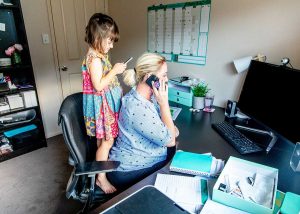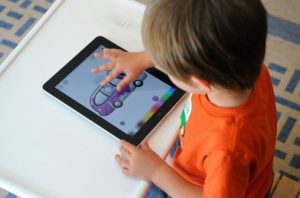Coping with screen time in COVID- 19: Tips for parents of children with speech delays
Coping with screen time in COVID- 19: Tips for parents of children with speech delays
 New pattern and schedule of work, pay-cuts, unemployment, home-schooling of children and maintaining social distance has adversely affected the mental and physical of people, in general. Parents of children with speech and language delays or multiple developmental delays are going through a state of confusion, strain as the general routine of their children, especially rehabilitation and schooling has disrupted.
New pattern and schedule of work, pay-cuts, unemployment, home-schooling of children and maintaining social distance has adversely affected the mental and physical of people, in general. Parents of children with speech and language delays or multiple developmental delays are going through a state of confusion, strain as the general routine of their children, especially rehabilitation and schooling has disrupted.
Even though parents know that their children, especially children with developmental delays need time, love, care, respect and nurturing during this difficult and uncertain stage, many of them don’t know how to deal with them or how to plan their day during this period.
Coping with screen time in COVID- 19
Parents rely on screen time for their children as they are busy focusing on professional work at home/ office and house chores throughout the day. Many parents fail to have actual control over their child’s screen time. As a result, children spend excessive time watching screen – be it TV, laptops, tablets or mobile phones. This limitless scree time can lead to delayed speech and language development in toddlers, (Paediatric Academic Societies Meeting, 2017).
It is also been related to disturbed sleep and eye problems like dryness, itching, myopia, etc. Avoiding screen exposure is not a practical solution for this, especially during this period of lockdown and social distancing. Right before introducing screen to children with disability, parents can take care of the following tips:
Supervision and co-view
Parents can take necessary steps to avoid their child learn how to turn the gadget on and unlock the password. Children are quick learners; especially at the younger age. When parents give the freedom to access their gadget, children take this opportunity to explore them without limits- both the hardware and the applications.
They get the opportunity to explore and watch any contents if adequate filtering is not applied. Kids do not know what is right/ wrong. The visuals are imprinted in their brain and inappropriate contents definitely mislead them and adversely affect their mental health and character formation. Parents can co-view and interact with their child during screen time.
Thus, screen time should not be considered as ‘alone time’. If the parents are engaged in other works, make sure that the child is using gadget in your vicinity and you can communicate with the child; instead of just monitoring them.
Choosing appropriate content and implementing interactive screen time
Active or interactive screen time can actually help nurture your child’s learning when used properly. Following skills can be developed and trained with the help of interactive screen time:
a) School readiness:
There are applications that improve child’s eye hand coordination (basic skills for writing and drawing) through games/ activities. Parents can choose them according to the level and interest of their child.
b) Linguistic skills:
By reading eBooks or accessing stories online, they learn new words and proper ways to pronounce them. Online picture dictionary or flashcards boost their vocabulary and teach them to find word meanings Applications which has activities like building and forming different structures creates spatial skills and knowledge on degrees of comparison. For example, children can learn how big a building may be compared to a car; or how small a butterfly is compared to a parrot. Thus, language development can be aided by active screen time.
Coping with screen time in COVID- 19
c) Cognitive skills:
Video games and learning applications train children to pay more attention to finer details in order to complete specific activities; thus, improving visual attention. Video games improve the concept ‘time’ or ‘duration’ by encouraging children to complete a level within a particular time period in order to unlock the next. These types of learning applications develop safe investigation, interactive learning and generate the foundation for children with developmental disability to keep on trying and to overcome challenges not only in the screen setting, but also in academics or outdoor activities.
The motivation for task completion can be trained through these games. While playing stress-free and simple educational games, children develop the skill of setting short-term goals of games, which are essential in problem solving. Games can foster curiosity; children often wonder which is the upcoming step, or what is the effect of taking a particular action in the video game. This is helpful in the development of logical reasoning.
d) Social skills:
In nuclear families with single child, gadgets can be chosen to improve social interaction. Simple activities like video calls with relatives or friends can be made interesting by carrying out ‘show and talk about favourite toy’, ‘matching games’, etc. Parent can support their children depending on the level of disability. Watching a show with the children will give the opportunity to introduce and share parent’s own life experiences and outlooks, and guidance.
e) Endless learning opportunity!
Children with disability learn more through real life experiences. However, not every child gets the opportunity to visit multiple places as per their interest; especially in the situation of pandemic. Technology exposes children to things and places those they may not be able to see; for example, viewing the underwater life, jungle animals, etc. can be made possible through interactive screen learning. The life outside the four walls of their home can be explored in detail through various applications. Many children with development delay deliver better performance in arts or extra-curricular activities.
Pandemic has shut the door of all these outdoor activities. But many associations and social media pages have come up with online short-term events/ learning classes (individual as well as group). Parents can pre book these events depending on the child’s interest, convenient time and sitting tolerance. Thus, parents can nurture their children’s skills and talents.
Speech Therapy tips for children with hearing loss during Covid -19
Challenges!
The hardship to implement interactive screen time is more in case of parents of children with attention deficit hyperactivity disorder (ADHD), autism spectrum disorder (ASD) or sensory processing disorders (SPD). Let me tell you some challenges that parents of these children face and tips to tackle them.
a) Time management
It’s hard to train children under this category to follow time management. They might spend hours in front of the screen as they cannot keep the track of time. In such cases, parents can avoid saying statements like “Ten more minutes, that’s all!”. Keep in mind that taking the device away and asking the children to ‘go and play’ or ‘study’ lead to frustration and ultimately ends up in kids throwing temper tantrums. Let the child watch short videos instead of longer ones. Tell the child, “After this let’s play”. The play can be majorly a sensory session which will give the child a wonderful opportunity to explore multiple things.
Easily available materials like ice cubes, pulses, foaming gel, etc. are excellent sensory materials which can hold child’s attention in learning through multiple sensory modalities. A planned session of this kind gradually trains the child to set time limits for screen time. Thus, an agreement between parent and child is created on a long run. Definitely, parents have to invest patience and time for accomplishing this as children with development delays needs additional support
and training to achieve certain goals or milestones.
b) Screen-free zones and encouraging two-way communication
A gadget-free environment is hard in most of the families in the current scenario as parents are busy with doing office-work from home and kids are engaged with home schooling or other online sessions. But a small planning can bring about a great change where in children can have interactive quality time with the parents. Family play time, meal time, etc. can be planned with no gadgets around. This routine improves face-to-face communication; the most important factor for language development. Children develop communication skills through two-way communication than one-way interaction with a screen.
Gadgets can be avoided in child’s bedroom too so as to avoid the tendency to use them during sleep hours. These minor changes can develop healthy eating habits and better sleep.
Coping with screen time in COVID- 19
In nuclear or single parent families, the ways to engage children with developmental delays in play activities are tougher compared to joint families. Creating sensory walls/ floors with learning materials or materials of child’s interest give opportunity of self-exploration to children with development delays.
c) Screen as an emotional backhander
Children with multiple disabilities have behavioral issues. Screen time can be very effective in keeping children calm and quiet especially when they throw temper tantrums. However, this should not be the only way they learn to settle down. Children need to be trained to handle emotions and manage boredom.
As mentioned before, investment of time and patience by the parents is the key for successful management of children’s emotions.
Conclusion
Parents, understand that it is normal to fell frustrated, stressed and frightened at this period. Make use of tele-health, seek advices from qualified medical and rehabilitation professionals for implementing appropriate management of your child and to stabilize your mental health. In doing so, you can train and strengthen routines of your children with disability in such a way that he/ she stay connected with you even during your work schedules, instead of sitting with the gadgets without interactions.
Plan visual schedules for daily routine to promote better behaviour in case of children with ADHD, ASD or SPD can be made practical with appropriate professional support. Stay strong and plan your days!!
If you wish to know more about Speech Therapy, kindly contact us at info@1specialplace.com
For more ideas check out our other related blogs
View this post on Instagram
- Paper Cups for Language Development - March 15, 2022
- ADIP Scheme for Hearing Impairment - August 4, 2021
- Auditory Verbal Therapy for Cochlear Implant kids - December 30, 2020





Leave a Comment
(0 Comments)